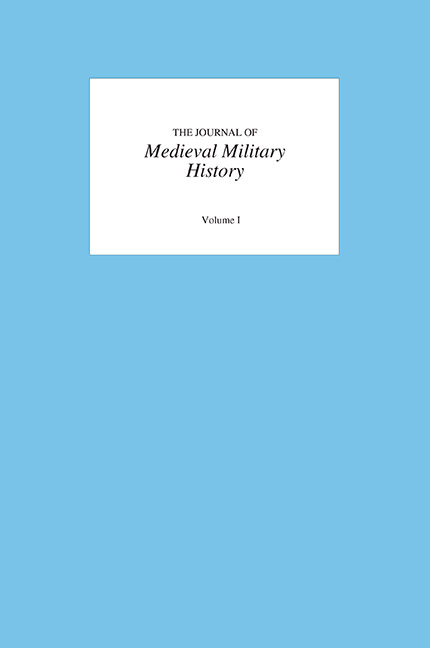Book contents
- Frontmatter
- Contents
- Editor's Introduction
- 1 The Vegetian ‘Science of Warfare’ in the Middle Ages
- 2 Battle Seeking: The Contexts and Limits of Vegetian Strategy
- 3 Italia – Bavaria – Avaria: The Grand Strategy behind Charlemagne's Renovatio Imperii in the West
- 4 The Composition and Raising of the Armies of Charlemagne
- 5 Some Observations on the Role of the Byzantine Navy in the Success of the First Crusade
- 6 Besieging Bedford: Military Logistics in 1224
- 7 ‘To aid the Custodian and Council;’ Edmund of Langley and the Defense of the Realm, June – July 1399
- 8 Flemish Urban Militias against the French Cavalry Armies in the Fourteenth and Fifteenth Centuries
5 - Some Observations on the Role of the Byzantine Navy in the Success of the First Crusade
Published online by Cambridge University Press: 12 September 2017
- Frontmatter
- Contents
- Editor's Introduction
- 1 The Vegetian ‘Science of Warfare’ in the Middle Ages
- 2 Battle Seeking: The Contexts and Limits of Vegetian Strategy
- 3 Italia – Bavaria – Avaria: The Grand Strategy behind Charlemagne's Renovatio Imperii in the West
- 4 The Composition and Raising of the Armies of Charlemagne
- 5 Some Observations on the Role of the Byzantine Navy in the Success of the First Crusade
- 6 Besieging Bedford: Military Logistics in 1224
- 7 ‘To aid the Custodian and Council;’ Edmund of Langley and the Defense of the Realm, June – July 1399
- 8 Flemish Urban Militias against the French Cavalry Armies in the Fourteenth and Fifteenth Centuries
Summary
Traditionally, specialists in the history of the medieval West who work on the First Crusade give insufficient attention to the role of the Byzantine empire in this enterprise and/or treat it in a more or less negative manner. There are several reasons for this Tendenz. First, Western eyewitness accounts of the Crusade and near-contemporary non-eyewitness Latin treatments of the campaign, based upon written and oral sources, minimize the role of the Byzantines in the success of the Crusade. Rather, these accounts tend to focus on the role of God in providing Western Christians with victory. Secondly, many of these Latin works, which serve as our narrative sources, are overtly hostile to the Byzantines and consider them to have undermined rather than to have supported Western efforts. This attitude would appear also to represent the views of various Crusade leaders who patronized the authors of these accounts.
For example, the chronicler Raymond of Aguilers is correctly depicted as having “hated and despised the Greeks.” In this, he likely represented the views of his patron Count Raymond of Toulouse.
From another perspective relative to the neglect of the Byzantine role in the Crusades, specialists in the history of the West during the Middle Ages tend to have limited first-hand access to non-Latin sources. During the later twentieth century, medievalists generally have been untrained in classical Greek much less in Byzantine Greek and have little or no expertise in Arabic, Armenian, Syriac and the other putatively more exotic languages that provide information on the Crusades from a non-Western perspective. Modern translations of these works have limited value from the philological perspective which, in my view, is crucial to the use of any text. Moreover, within the narrow framework in which the non-Latin sources generally are considered by medievalists, there is a tendency to focus on translations of the Alexiad written by Anna Comnena, the daughter of the emperor Alexios. Her account often is considered as plain text. Thus, it is mined for factual details that often are taken out of context, e.g. the putative effectiveness of Western heavily armed mounted troops and the development of the counterweight trebuchet.
- Type
- Chapter
- Information
- Journal of Medieval Military HistoryVolume I, pp. 83 - 100Publisher: Boydell & BrewerPrint publication year: 2002



